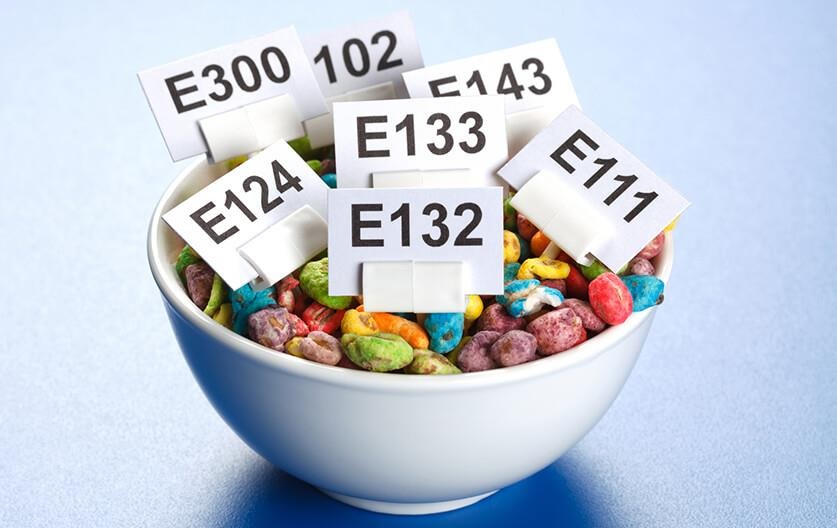- Home
- Mind & body
- Food additives you should avoid
At CBHS we help you manage your health challenges. We believe in offering you the services, support and tools you need to live your best life.
Health and Wellness Programs are available to support eligible members towards a healthier lifestyle. Each Health and Wellness Program is subject to its own eligibility criteria.
Contact us for more information and to confirm your eligibility for a program.
Food additives you should avoid

What are food additives?
Food additives are chemicals that are added to food and beverages to keep them fresh or enhance their colour, flavour and texture. They can be made from natural or artificial sources.
Who approves food additives?
Food Standards Australia New Zealand regulates food additives. The use of food additives are governed by the Food Standards Code. If a food company wants to start using a new additive, they need to provide evidence of its safety to FSANZ. FSANZ will then review the evidence before it approves it for use in Australia.
Where are food additives listed?
The ingredients list on the food label of the product will list food additives, however if a food additive takes up less than 5% of the complete food product, it doesn’t need to be listed. So, it’s possible there are small amounts of food additives in a product that aren’t on the food label or listed on the packaging.
According to the Food Standards Australia New Zealand, most food additives are listed by their class name and then the name of the food additive or the food additive number. For example, Colour (Caramel I) or Colour (150a). You can identify flavouring additives by the words “flavouring” or “flavour” or by a more specific name or description. As the Australian Dietitians Association states, ingredients in manufactured foods are listed in descending order of quantity. This means the first ingredient is the main ingredient, and the last ingredient listed is the smallest by weight.
You can get a list of food additives by name or number at Food Standards Australia and New Zealand.
Which food additives should you avoid?
Colours
As Choice Australia highlights, in 2010, a UK Government-funded study found that there was a link between a mixture of some colourings and hyperactivity in children. The British Food Standards Agency has since encouraged food manufacturers to find alternatives to these colours and some have stopped using them completely. Within the EU, products containing these colours are now labelled “May have an adverse effect on activity and attention in children”.
The colours were tartrazine (102), quinoline yellow (104), sunset yellow FCF (110), carmoisine (122), ponceau 4R (124) and allura red AC (129).
Yet, the Food Standards Australia and New Zealand states that these food additives don’t pose any risk to public health and safety for children in Australia.
Preservatives
Flavoured drinks such as soft drinks, flavoured mineral waters, cordials and fruit drinks may contain benzene (a known carcinogen). While not added to the products, the combination of sodium benzoate (211) and potassium benzoate (212) and ascorbic acid (vitamin C) can form benzene which is a known carcinogen. Choice Australia recommends steering clear of products that contain benzoates and ascorbic acid when found in combination.
Processed meats
The World Health Organisation International Agency for Research has classified both potassium and sodium nitrate (249, 250) as probably carcinogenic to humans. WHO recommend limiting or avoiding processed meats like sausages, frankfurts, salami, bacon and ham.
Wine and dried fruit
Preservatives that Sulphur (220 – 228) can trigger asthma attacks. These are often used in wine, beer, fruit juices, processed foods, and dried fruits.Artificial sweeteners
Artificial sweeteners are often used as a weight-loss aid but there’s conflicting research about how healthy they are for you. As Choice Australia state, overall being overweight poses a bigger risk to your health than artificial sweeteners.
You can also read more about food and drink additives to avoid at Choice Australia.
More information
For information about how to read food labels or to get advice on food additives, it’s a good idea to speak with your doctor or an accredited dietitian.
Sources
https://healthywa.wa.gov.au/Articles/F_I/Food-additives
https://www.foodstandards.gov.au/consumer/additives/additiveoverview/Pages/default.aspx
https://www.foodstandards.gov.au/consumer/labelling/Pages/Labelling-of-food-additives.aspx
All information contained in this article is intended for general information purposes only. The information provided should not be relied upon as medical advice and does not supersede or replace a consultation with a suitably qualified healthcare professional.
Health and wellbeing
programs & support
You Belong to More with CBHS Hospital cover:
- Greater choice over your health options including who treats you
- Get care at home with Hospital Substitute Treatment program
- Free health and wellbeing programs to support your health challenges
Live your healthiest, happiest life with CBHS Extras cover:
- Benefits for proactive health checks e.g. bone density tests, eye screenings
- Keep up your care with telehealth and digital options
- Save on dental and optical with CBHS Choice Network providers
